10 Aug 2023
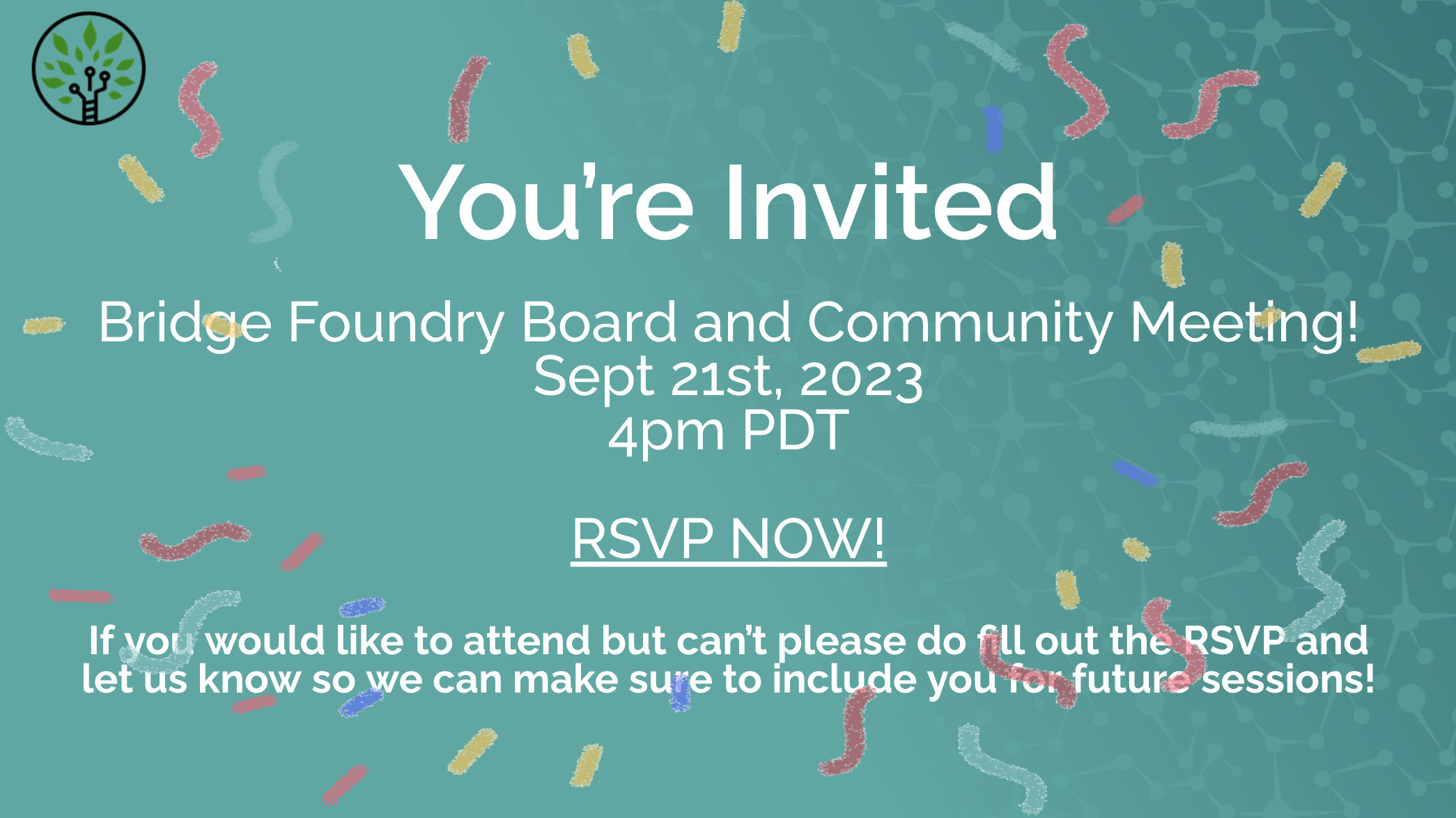 We (the Bridge Foundry board) would like to invite all members of our community to join us as we look back and celebrate all that we have accomplished since our initial strategic plan in 2017 and, with your help, start planning our future. We’ve done a lot over the past six years, and it’s important to come together as a community to celebrate our accomplishments while we also looking ahead to the exciting work we have in front of us. Join for a celebratory session and help us start planning to build an even brighter future for our community.
We (the Bridge Foundry board) would like to invite all members of our community to join us as we look back and celebrate all that we have accomplished since our initial strategic plan in 2017 and, with your help, start planning our future. We’ve done a lot over the past six years, and it’s important to come together as a community to celebrate our accomplishments while we also looking ahead to the exciting work we have in front of us. Join for a celebratory session and help us start planning to build an even brighter future for our community.
We hope to see you all on Sept 21st, 2023. 11:00pm UTC
RSVP to let us know you are coming!
Timezone cheatsheet (because timezones are hard)
Every Time Zone for all others.
17 Jun 2023
It is with deep sadness that we write this update. Carolyn Van Slyck, a prominent member of Women Who Go and GoBridge, has passed away. She gave immense value to the organization, but more than that, she was a wonderful person to work with and this loss is felt deeply throughout the community.
When Women Who Go had a change of leadership, Carolyn was one of the first to volunteer to help run the organization. Whenever you needed anything, she would make it happen. She had a lot on her plate, but wanted to make sure GoBridge and WWG were supported and nourished. She was involved in everything, very communicative and helpful wherever she could be.
It is hard to find people like her, and we feel very lucky to have been able to work with her. She was an integral part of Women Who Go, and it wouldn’t be where it is today without her support and contributions.
Thank you Carolyn.
The image below is from Carolyn’s personal website
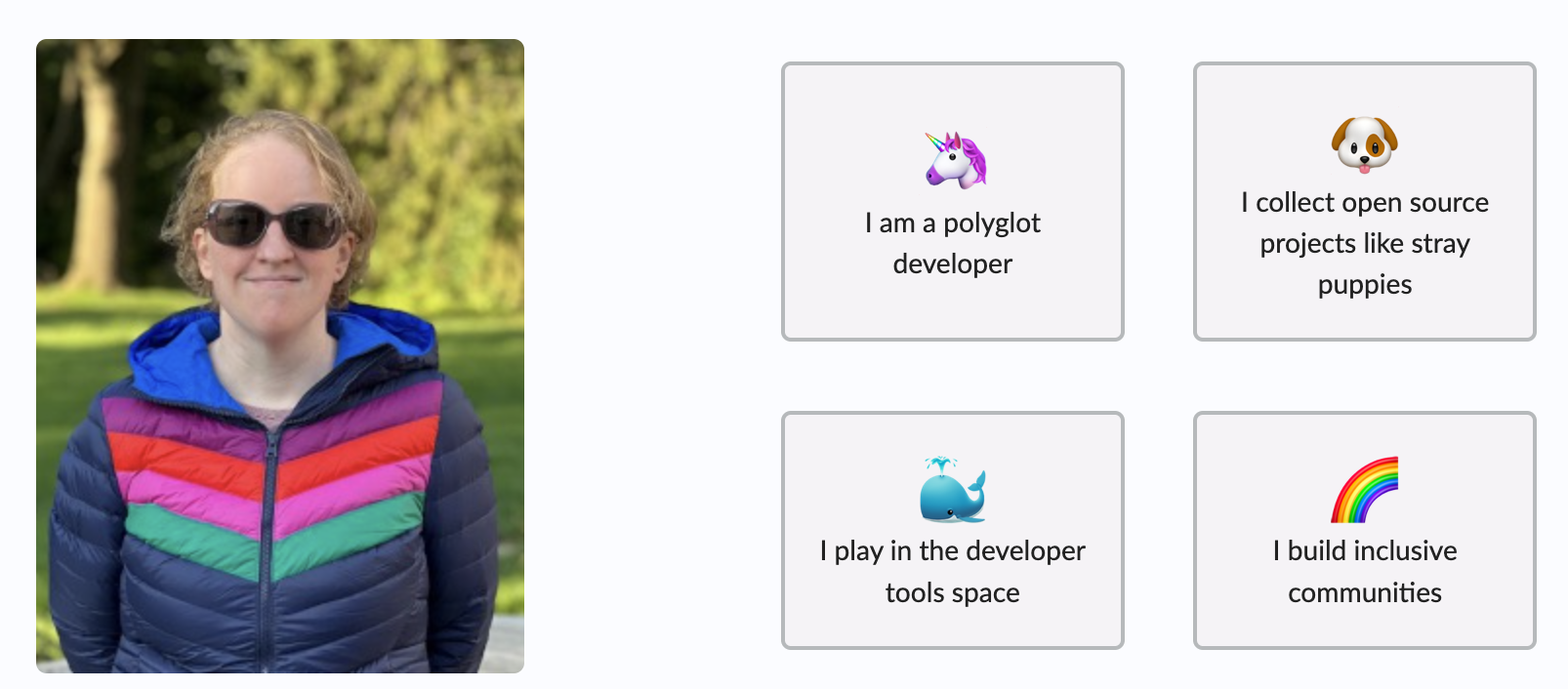
30 Jun 2019
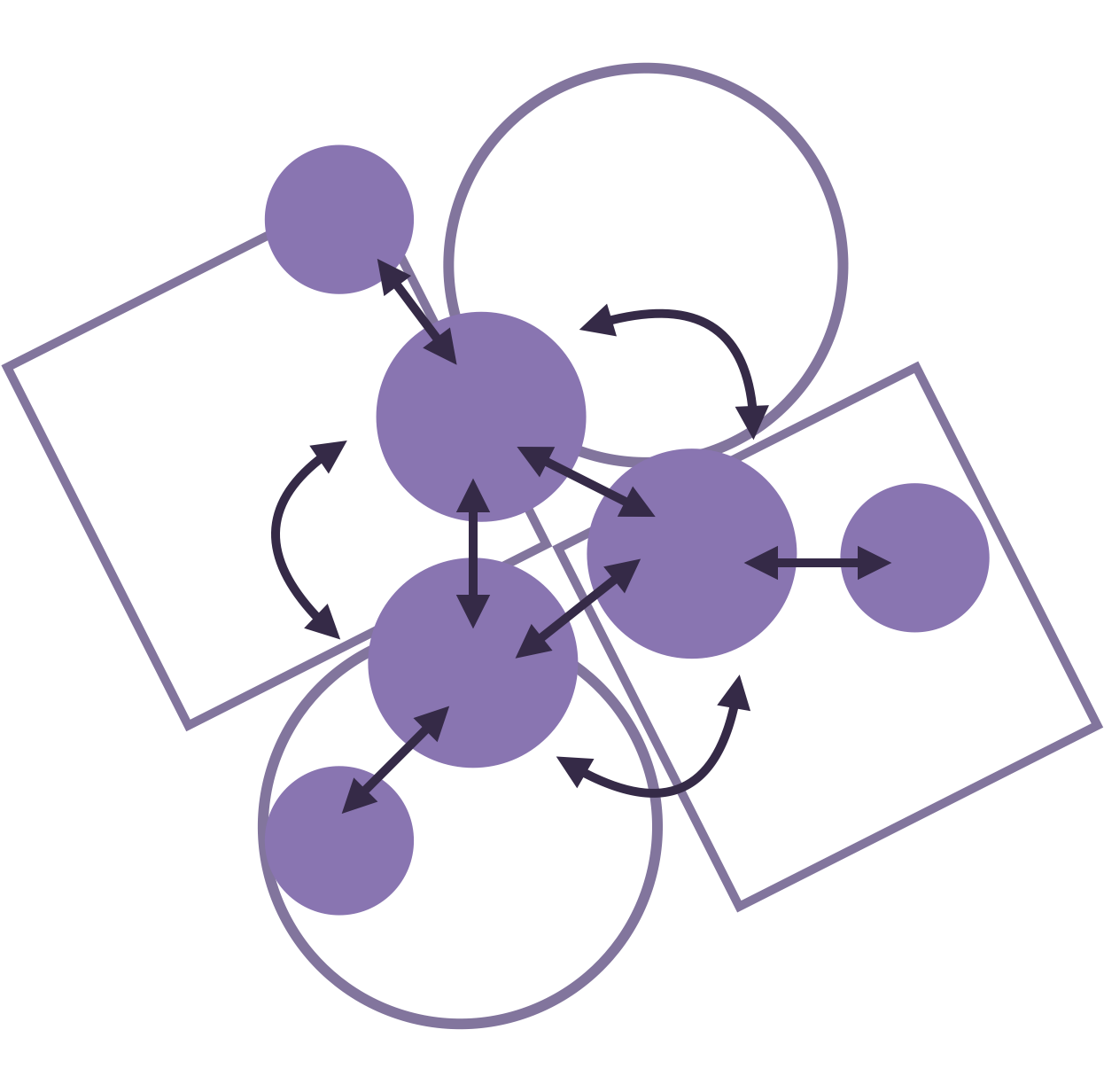 The open workshop model assumes that
everyone who participates can contribute to creating an effective and fun
learning experience – in fact everything we do is
a creation of all of the participants. This is analogous to open source at its
best. Bridge communities are structured with a strong core and many more
contributors.
The open workshop model assumes that
everyone who participates can contribute to creating an effective and fun
learning experience – in fact everything we do is
a creation of all of the participants. This is analogous to open source at its
best. Bridge communities are structured with a strong core and many more
contributors.
The majority of volunteers are working software developers, sharing their joy of coding. We also have incredible volunteers who come from all different kinds of jobs and everyone helps with all different aspects of community making.
Ten years ago, we didn’t expect to create a global movement. Approximately 200 software developers attended Golden Gate Ruby Con 2009. Six of them were women. Two of them were named Sarah. They teamed up to change their local community, and using open source and agile techniques, the workshop model evolved as a creation of many people who worked together to make those first workshops happen (and it’s still evolving).
Sarah Mei once referred to the process as Xtreme Community. Create the right kinds of events, outreach to the people you want to include, set goals: focus on something you can fix!
21 Jun 2019
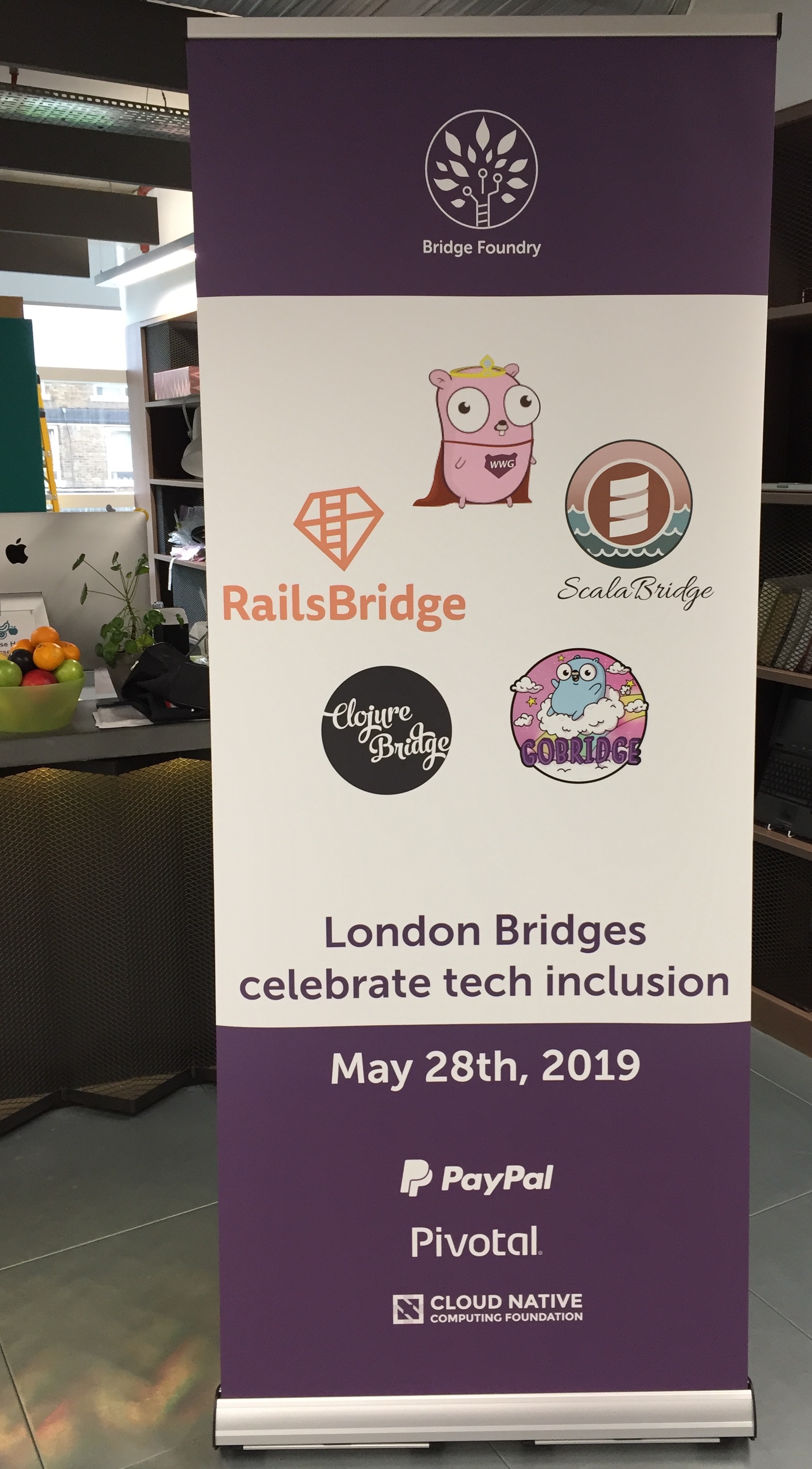 On May 28th, 2019, the London Bridges gathered for the first time across
four different technical communities (Ruby, Clojure, Go and Scala), bringing
together students, volunteers, teachers and organizers to celebrate how we
have increased diversity and inclusion in our communities, and to share stories
of our successes and challenges.
On May 28th, 2019, the London Bridges gathered for the first time across
four different technical communities (Ruby, Clojure, Go and Scala), bringing
together students, volunteers, teachers and organizers to celebrate how we
have increased diversity and inclusion in our communities, and to share stories
of our successes and challenges.
Local leaders of Bridge Foundry chapters exchanged ideas with supporters and leaders of other mission-aligned groups over lively dinner conversation followed by a short presentation and discussion.
Sarah Allen shared the history of the grassroots organization, how Bridge Foundry started as RailsBridge and grew to include volunteer-led communities all over the world across 8 programming languages. The London leaders shared more detail about UK events across several years. The first two events were organized in Edinburgh, Scotland, first RailsBridge in conjunction with Scottish Ruby Conference, which inspired Ali King to organize a ClojureBridge workshop in the same city. Sarah talked about how each workshop is an epic event, organized by regular folks who work in the tech industry, often with no teaching or event organizing experience, led to participate through a desire to create change or learn more themselves.
11 May 2019

14 Oct 2018
On October 11, 2018, community and tech leaders gathered at the Kapor Center in Oakland, CA to hear about Bridge Foundry’s impact and vision for the future, including the announcement of the new industry outreach program.
Bridge Foundry’s CEO, Sarah Allen, shared the organization’s 2017 diversity impact results and successes teaching code skills to people underserved in the tech industry. Starting with the organization’s history and growth, she was joined by sponsor representatives who shared their insights on this work and then moving on to describe the next steps in making diversity the norm in the tech industry.
11 Oct 2018
The tech industry has a serious diversity problem. In addition to well-documented pipeline problems, there exists a lack of good jobs with opportunity for advancement based on actual skill and capabilities.
Bridge Foundry today announced the official launch of its Industry Partner Program. Tech companies want to do better, but lack effective techniques. Bridge Foundry has a track record of increasing diversity in tech communities and we see an opportunity to address issues directly at the source.
Our sponsors fund the research to isolate specific techniques that are most effective for both non-profit and corporate settings. This research will be critical to accelerate the work, yet we also need real-world data to focus our research on the most urgent needs.
15 Feb 2018
Post by Kelley Robinson, ScalaBridge founder
We had our first workshop in February of 2017 (in San Francisco), and since then have helped other chapters in 10 cities hold their own workshops. We had our second workshop in SF in August of 2017.

08 Jan 2018
Post by Mary Jenn
I often find myself clarifying just what Bridge Foundry is about to people. Firstly: While we are about enhancing the diversity of the software engineering community, we are an INCLUSIVE community and we invite people from all walks of life into our workshops. The reason why: we welcome the people who typically dominate the industry to participate at events led by people who are not usually in the majority. We seek to look past outward appearances, seeing each person
as sharp, capable and intelligent based on their words and actions. If someone makes a mistake, we assume
they may have limited knowledge and infinite potential to learn.
28 Nov 2017
Post by Sarah Allen
The scariest part of creating the nonprofit for me has been the conversation with volunteer leaders to talk about our mission. I was afraid that everyone was focused purely on teaching coding. I felt that there was something bigger happening. Software developers would come up to me in unexpected places and say, “RailsBridge changed my life,” or “I started coding at a MobileBridge workshop.” We were creating this global technology culture where diversity is the norm.
I was afraid that my grandiose vision would come across as impossibly naive. Diversity issues are currently framed as a supply issue, a pipeline problem, and we need to start in kindergarten to change things. Of course we do need to fix things for the kids, yet the stories of the women who reached out showed me that we can change things now, in fact we must. We need to make it so the industry is a place where everyone is treated with respect and where everyone has the opportunity to learn.
What I found was that across all of the bridges, people wanted to be part of something bigger. In fact, they already sensed they were part of something bigger. The result was a movement-wide, collective “yes.”
20 Jun 2017
Post by Sarah Allen
Bridge Foundry volunteers share skills by creating open source curriculum,
at free teaching events and in online mcommunities. Through teaching and
organizing, we learn to be leaders, as well as levelling up our own tech skills.
Most workshops are organized by independent communities, sometimes by one
individual who has been to a workshop at a conference and then decided to
create a community where they live.
From its beginnings as RailsBridge, we have grown to include 8 Bridges, which now include ClojureBridge, MobileBridge, GoBridge, ElmBridge, ElixirBridge, ScalaBridge, and RustBridge.
Each bridge focuses on different technologies. Every event connects working software developers and community or industry leaders to people in our communities who are underserved intech, which is actually a majority of the people in our society.
Every event is organized by volunteers with teachers and TAs who range from industry experts to people who know just a little bit more than the students. With technology always changing both teachers and students learn together.
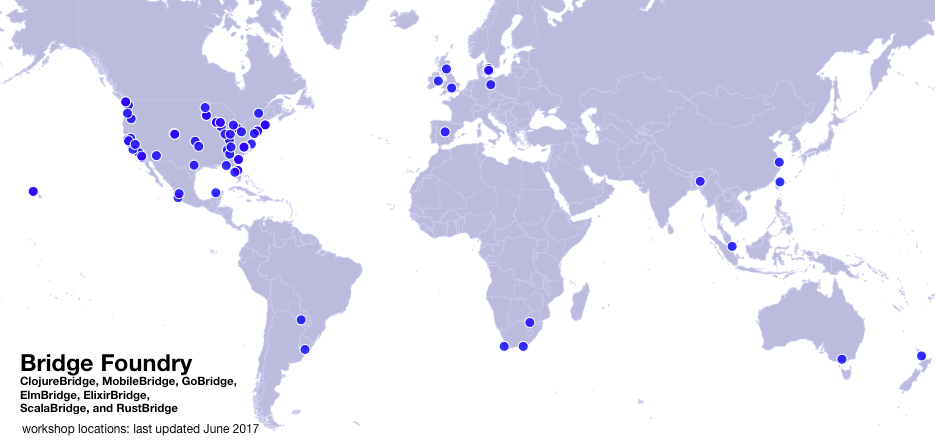
If you are interested in getting invovled or supporting this work, please get in touch!
09 Dec 2015
Post by Michelle Glauser
 Ever since I graduated from Hackbright Academy three years ago, I’ve wanted to help other women join tech. I’ve enjoyed attending and organizing RailsBridge, DjangoGirls, and JavaScript workshops in Shanghai, London, and San Francisco, but I often wondered how I could help women and genderqueer individuals struggling economically to learn to code, especially if they don’t have their own laptops. A little over a year ago, I learned about the Tenderloin Technology Lab, a computer lab that’s part of the St. Anthony’s Foundation in the Tenderloin of San Francisco, an inner-city neighborhood known for poverty and diversity.
Ever since I graduated from Hackbright Academy three years ago, I’ve wanted to help other women join tech. I’ve enjoyed attending and organizing RailsBridge, DjangoGirls, and JavaScript workshops in Shanghai, London, and San Francisco, but I often wondered how I could help women and genderqueer individuals struggling economically to learn to code, especially if they don’t have their own laptops. A little over a year ago, I learned about the Tenderloin Technology Lab, a computer lab that’s part of the St. Anthony’s Foundation in the Tenderloin of San Francisco, an inner-city neighborhood known for poverty and diversity.
26 Aug 2015
Post by Isa Herico
The Bridge Foundry community is filled with passionate change agents.
Not too long from when Sarah Allen and I met, she told me the story of Stone Soup. In this story, a group of people combine forces to make something happen in order to help themselves and each other. As one having organized some RailsBridge workshops, I can attest to the incredible forces that bring all of the volunteers together (teachers and assistants, organizers, donors, advocates) to make not only workshops happen but to keep the RailsBridge soup pot full. Those that have donated their time and energy into any Bridge Foundry effort, let’s call them *Bridgers, keep connections and pipelines open to build and cultivate this network.
29 Apr 2015
 Last weekend, PlanGrid hosted the third MobileBridge iOS workshop, teaching iPhone app development to women and their friends. We split into 3 classes. Two classes taught the Rotten Tomatoes curriculum — populating a tableview with data from the internet. The third class learned from the new prototyping curriculum, where students sketched app UI on paper, consulted quick usability tests, then used photos of the sketches as screens in a working iOS app.
Last weekend, PlanGrid hosted the third MobileBridge iOS workshop, teaching iPhone app development to women and their friends. We split into 3 classes. Two classes taught the Rotten Tomatoes curriculum — populating a tableview with data from the internet. The third class learned from the new prototyping curriculum, where students sketched app UI on paper, consulted quick usability tests, then used photos of the sketches as screens in a working iOS app.
21 Mar 2015
In December, I helped investigate the identities of 4 people who represent a much more diverse tech scene that we see in the media these days. Grace Hopper was identified in the photo, but the three men with her were not.

SI Neg. 83-14878. Grace Murray Hopper at the UNIVAC keyboard, c. 1960.
Credit: Smithsonian Institution
08 Feb 2015
We’re bridge builders. We are dedicated to doing whatever it takes so that the makers of technology are reflective of our society, because diversity fosters innovation. We also believe that programming literacy is a fundamental skill, and that people need to understand the technologies they depend on. To reach this goal, we’re helping organizations train, mentor, network, and encourage people – particularly those who are underrepresented – to fully participate in technology, and have fun doing it.